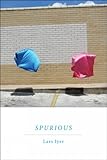There was a time some years ago when it began to rain in my apartment. I was eighteen, living alone in a large city, going to school all day and working all evening; distracted, in other words, and perhaps not as on-the-ball as I should have been when the shower started dripping. The drip turned into a permanent stream of scathingly hot water, and then the bathroom, being small and virtually airtight—neither of the apartment’s windows opened—filled with steam.
Steam, of course, condenses into water, and within a day or two the bathroom had turned almost subtropical. Raindrops fell gently from the ceiling; paint bubbled; water slid down the walls and pooled in the corners; a mushroom appeared in an unreachable corner. I imagined the damage being done to the paint job was irreparable, but this struck me as a reasonable trade-off for the landlord’s failure to do anything about the cockroaches.
 All this to say that I feel some kinship with Lars, the narrator of Lars Iyer’s Spurious, a debut novel and a meditation on friendship, failure, the apocalypse, messianism, and mold. Lars’ apartment is being overtaken by a mysterious damp, something altogether darker and more sinister than the indoor rain I dealt with in Toronto all those years ago, originating from somewhere within his kitchen wall. Brown waves of damp spread over the plaster. The wall is wet to the touch. Florid mold blooms in patches and spores drift through the air. Water can be heard rushing somewhere behind the bricks. Experts in the field are baffled.
All this to say that I feel some kinship with Lars, the narrator of Lars Iyer’s Spurious, a debut novel and a meditation on friendship, failure, the apocalypse, messianism, and mold. Lars’ apartment is being overtaken by a mysterious damp, something altogether darker and more sinister than the indoor rain I dealt with in Toronto all those years ago, originating from somewhere within his kitchen wall. Brown waves of damp spread over the plaster. The wall is wet to the touch. Florid mold blooms in patches and spores drift through the air. Water can be heard rushing somewhere behind the bricks. Experts in the field are baffled.
The damp, it seems, might be symptomatic of larger problems. Specifically, the world is coming to an end. Lars is a writer, as is his “slightly more successful” friend W., and they’re united by, among other things, the certainty that we’re living in the End of Times. It isn’t the easiest of friendships—“One of us is dragging the other down, W. and I decide, but which one? Is it him or me?”—but there’s a certain amount of shared history. They’ve been friends for a while now:
W. remembers when I was up and coming, he tells me. He remembers the questions I used to ask, and how they would resound beneath the vaulted ceilings. —‘You seemed so intelligent then’, he says. I shrug. ‘But when any of us read your work…’, he says, without finishing the sentence.
Lars and W. are oddly inseparable, despite W.’s fondness for peppering Lars with verbal abuse. He does it out of love, he says. (“‘Yes, I love you’, says W. ‘You see, I can talk about love. I can express my feelings. Not like you’.”)
They are somewhat obsessed with Kafka, although since theirs is a literary friendship, considerations of Kafka raise an unsettling question: which one of them is Kafka, and which one of them is Max Brod? They might both be Brods. It’s a possibility. Actually, it seems increasingly probable. They’re stuck in the End of Times, and they are neither the men nor the intellectuals whom they’d like to be. “’Compare our friendship,’
says W., ‘to that of Levinas and Blanchot’. Of their correspondence, only a handful of letters survive. Of ours, which takes the form of obscenities and drawings of cocks exchanged on Microsoft Messenger, everything survives, although it shouldn’t. Of their near daily exchanges, nothing is known; of our friendship, everything is known, since I, like an idiot, put it all on the internet.
It’s true, he did put it all on the internet. Spurious originated as a blog.
They aspire to think truly original thoughts, Lars and W., but also, they want to be led. They long for meaning, for direction, for better gin. They are mentorless, and they would like to find a guide through the intellectual wilderness. It isn’t that they’ve been unable to find one—they’ve gone through three leaders so far—but Lars and W. make the same misstep each time. Each time they find a leader they go and tell him that he’s their leader, at which point the leaders understandably distance themselves.
They suspect that if one of them were to have a truly original thought, just one, that might elevate them and change everything. This hasn’t happened yet, and they’re adrift and painfully aware of their shortcomings in a world that seems to them to have come undone; despite this, they’re “essentially joyful,” and the book has a marvelous lightness of touch. In the meantime, something terrible is happening in Lars’ apartment. If the world’s moving toward the end of days, the apartment’s headed there even faster.
The book’s flaw is its insistence on repetition. Several things are mentioned two or three times, and it’s not at all clear to me that the repetition serves the work. We know that W.’s friends prefer W.’s girlfriend Sal to W., for instance, because we’re told this twice. On the same page.
But the repetition is a minor qualm. Iyer has a remarkable control of tone. It’s the End of Times, the narrator and the only other character in the book ache with self-disgust, most of the text is concerned with Lars and W.’s endless yammering, there are chapters about mold. The kind of book, in other words, that sounds like it ought to be unreadable, but manages to be intelligent, wildly entertaining, and unexpectedly moving instead.








